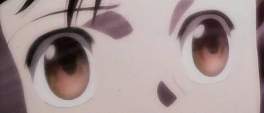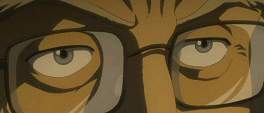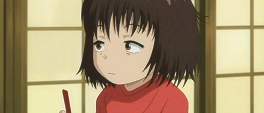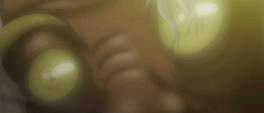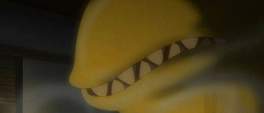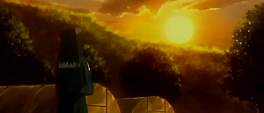It's inevitable that Mokke is going to be compared to the seminal Mushishi: it deals with a similar "hidden to all but those who can see" neer-do-wells, has a similar way of dealing with them and maintains the same kind of morality about their place within nature. This may sound like Mokke is nothing but a substandard copy of Mushishi but in actuality, the similarities are minimal at best.
Ostensibly set in modern day with two sisters, the younger of the pair has the ill fortune to be easily possessed by wandering spirits while the other older of the two is able to see and hear the ephemeral critters, a gift she shares with her grandfather. The first three episodes take different approaches to dealing with the entities: the first is about the older sister wanting to protect the younger one culminating in her banishing a shadowy antagonist, the second is about a helpful but tricksy fox spirit, while the third is about a spirit which follows a doubting person around, devouring their confidence and vitality. The nature of the entities is stated on a case by case basis and borrows more from Buddhist and Shinto mythology than the "part of nature" route taken by Mushishi. In terms of comparisons, Mokke borrows more from Dennou Coil than it does anything else; the similar focus on younger children rather than teenagers or adults, even the first spirit is akin to Dennou Coil's digital aberrations.
The most pressing issue with the first three episodes is how flat it feels despite its rich subject matter. Both of the protagonists are easy to like and certainly display enough substance to last a season, however the overall feeling of self-containment is hard to shake. While dealing with supposedly naturally occurring micro-deities, there is never any sense of an ecology or busyness about them; there is only one new spirit per episode which means that it will likely fall into an episodic, monster-of-the-week series rather than one with an overarching plot. This isn't a negative in and of itself but Mokke unfortunately lacks the depth to make that format work if the first episodes are anything to go by.
Despite centring on younger children, the show rarely feels childish and has a charming innocence to it that is remarkably endearing. This is helped along by both the stirring, traditional Japanese soundtrack and the visuals which, despite coming from the venerable MADHOUSE, are remarkably simplistic; the younger protagonist is in some scenes cute as a button while in others is barely recognisable as a child. Despite her possessive-spirit affliction, she is refreshingly energetic and child-like, certainly very different from the invalid as one would expect given a synopsis of the series. The older sister is aesthetically generic and unremarkable but more than makes up for this by being the most interesting of the two. The first episode paints her as a typical protective figure for her younger sibling yet in the latter two she displays far more subtleties in terms of growth and maturity.
The greatest obstacle the series needs to overcome is its lack of polish. Pleasant and charming it may be however it doesn't have the humanity or the depth to maintain interest. Mokke is certainly not a bad show by any stretch of the imagination, however its portrayal of spirits and hidden supernatural elements is, ironically, sorely lacking any real substance. The spirits come across more as curios, mere side-notes to facilitate the day-to-day aspects of the sisters' lives rather than being what they should be: the most engaging part of the series. It is uncertain what the other episodes will hold for Mokke, if it maintains its current tone and template then it would be a great shame given such promising subject matter, if however it instates a tangible narrative and sheds the teething troubles the introductory episodes have then it should be an unassuming but fun series.
